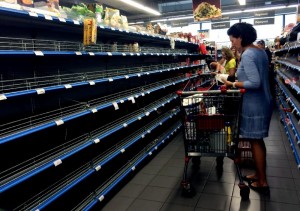We might count it a distraction for the Greeks, from the Greek crisis, that they could still be rescued. Their focus is thus drawn abroad, to the anxious European crisis meetings. By some miraculous decision elsewhere, emergency funding might suddenly come through, and all the bank machines would be working again. This would be a first step back to “normal.”
It is thus, for them, not only possible but natural to think the source of their problem is elsewhere, and entirely out of their hands. The “Big Fat No” they voted in the referendum last weekend could be interpreted as merely a shout to the lifeguards, to remind them that they are drowning. In case the lifeguards had forgotten.
I have been following the crisis with more than my usual curiosity for breaking news, and reading first-hand reports from Greece with particular attention. This is because I am curious to see what happens when a Nanny State breaks down.
My sympathy for the Greeks is not worth expressing. It has no cash value. I am also aware that many relatively “innocent” people are caught in the vortex. Their honestly earned life savings are in jeopardy, likely to be seized or turned into worthless scrip.
Shopkeepers are suddenly faced with penniless customers, and no way themselves to pay for new goods. Things like pharmaceuticals cannot be imported, when the trade financing system breaks. The supply of insulin, for instance, was running out, according to one report. I have some idea what that means.
But “Europe” could still come through. Even if the bankers have taken enough hits, and refuse to take any more on a hugely expensive bailout (more than 50 billion Euros for starters), something will happen. Annoyed as some of them may be with Greece, the Europeans are not heartless. Their politicians cannot afford to be seen as indifferent to real suffering in a place that is getting plenty of media attention.
Humanitarian aid will follow. There will be scandals about the slowness and inefficiency with which it is delivered, but there always are. Journalists will be looking for heart-rending stories. What they find can be played up, big.
The odd thing is only that the mess is entirely man-made. Absent an earthquake, tsunami, volcanic eruption, or at least a hurricane, it is a national disaster of a special kind. It has been foreseeable for the last fifteen years – since a socialist government cooked the national books to get into the euro in the first place.
Indeed, Greece has a long modern history of fiscal irregularity that was noted and warned of at the time. The hyperinflation that may follow a “Grexit” would hardly be unprecedented.
And as a Greek friend once explained to me, with the candor for which Greeks are famous, or infamous: “Centuries of living under the thumb of the Musulmans taught us a thing or two. Mainly it taught us that failure is always someone else’s fault.”
The same might be said in some other constituencies, however. The (old Roman) West never succumbed to Muslim conquest, but has learned the art of blame-assignment from other tutors. It is in the nature of the “democratic” Nanny State to be looking constantly for scapegoats.
When the politicians’ quasi-socialist schemes fail to help the poor, or help anyone, even while piling up mountainous peacetime debt, it cannot be their fault. Someone else must be demonized for subverting their good intentions. It is “capitalism that has failed,” and the only solution will be to punish the capitalists, i.e., finish off the goose that laid their golden egg.
Now, having trained our attention on Greece, the question I have to ask is: What happens when there is no possible rescuer? Let us suppose that it is not Greece we are looking at, but the entire Western world that has finally succeeded in maneuvering itself into the Greek fix.
For color, let us remember that the U.S. national debt now stands around 20 trillion, and that the number omits any consideration of unfunded liabilities, and includes other nefarious accounting tricks. And that Italy, Spain, and Portugal are next for the gibbet after Greece; and little countries like Iceland, Ireland, and Cyprus only escaped because they were small and said “please” so nicely.
Let us imagine the bank machines empty here, the government scrip worth the same as Confederate money, and thus economic activity suddenly reduced to the informal bartering arrangements with which surviving Greek companies are already experimenting.
Let us imagine some time passing, before the pharmaceutical companies agree to trade insulin in return for chickens and barley-meal. During which, the pharmaceutical companies collapse.
And let us take a good look at those pictures of Greek supermarkets, in which all the shelves are bare, except the top ones to which the non-food items had been moved.
Or consider what happens when the power grid fails, and the few remaining batteries are draining, and the gas station pumps have run dry, and you may clop down the Interstate on a horse, if you have one, and aren’t afraid someone will kill you for it.
And maybe gentle reader has put away gold, but you can’t eat gold. (Most of which is now, incidentally, only “gold paper” – becoming more worthless scrip.)
For all of this is prefigured in Greece, and at the back of our minds, we probably all know it. Hence our fascination.
What happens then?
Whom shall we blame?
It would be wrong, very wrong, to look forward to such a catastrophe, ugly as the world around us may seem. The happy assumption that something good can come of it will only be entertained by those who have yet to experience the phenomenon. Most of them will die.
There are times when one may turn only to God. It would be to our advantage to turn now, for the light we will need when the darkness comes.















